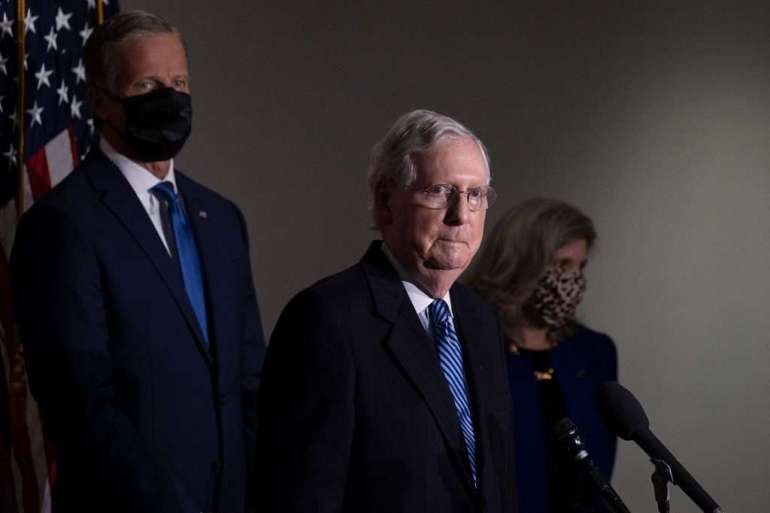Republicans livid over Trump’s plan to reduce troops in Afghanistan

Other Republicans agreed with McConnell on Monday.
“The concern would be it would turn into a Saigon-type of situation where it would fall very quickly and then our ability to conduct operations against terrorist elements in the region could be compromised,” Sen. Marco Rubio (R-Fla.), chair of the Senate Intelligence Committee, said in a brief interview. “That’s my primary concern right now.”
Republicans expressed widespread fear that lowering the number of troops could allow the Taliban to continue to overthrow elements of the Afghan government.
“You can’t simply unilaterally draw down troops,” said Sen. Mike Rounds (R-S.D.), a member of the Armed Services Committee. “I think it’s a serious mistake to unilaterally walk away.”
Sen. John Barrasso (R-Wyo.), who has traveled to Afghanistan with Trump, said he was “hoping that the president listens and takes advice from the men and women on the ground, the commanders in the field.” And Sen. Lindsey Graham (R-S.C.) said a 2,500-troop contingency “may be the residual force that protects us from a collapse.”
Republicans’ comments represented a rare break from the president, especially as they remain supportive of Trump’s long-shot lawsuits alleging widespread voter fraud in the 2020 election.
But GOP lawmakers — and McConnell in particular — have consistently spoken out against Trump’s tendencies to withdraw American troops from the Middle East. Last year, McConnell condemned the administration’s decision to remove U.S. forces from northern Syria and introduced a measure opposing such a withdrawal.
Speaking from the Senate floor, McConnell said an American retreat would “embolden” the Taliban — which is already failing to adhere to its obligations under a peace agreement negotiated earlier this year — and give al-Qaida “a big, big propaganda victory and a renewed safe haven for plotting attacks against America.”
McConnell also went after members of both parties who have called for reductions of U.S. troop presence in the region, arguing that a “premature American exit would likely be even worse” than President Barack Obama’s decision to withdraw from Iraq at the end of 2011 — a decision experts said led in part to the rise of the ISIS caliphate.
Trump has courted advice from lawmakers and senior officials on both sides of the issue, though he has not adopted a consistent philosophy himself. Last week, he fired Defense Secretary Mark Esper at least in part for pushing back against Trump’s latest effort to reduce U.S. troop levels in the region.
Esper’s replacement, acting Defense Secretary Christopher Miller, is viewed as being supportive of Trump’s push. Last week, Miller hired retired Army Col. Douglas McGregor, a critic of the U.S. presence in Afghanistan, as a top adviser.
The Trump administration’s move drew the support of at least one Republican, though. Sen. Jim Inhofe of Oklahoma, chair of the Armed Services Committee, said in an interview that he is “comfortable” with the proposed drawdown. Inhofe said he had talked about the issue with Gen. Mark Milley, chairman of the Joint Chiefs of Staff.
McConnell credited Trump with helping to create conditions on the ground that “will secure the enduring defeat of terrorists.” But, he said, those same militant groups “would like nothing more than for the most powerful force for good in world history to simply pick up our ball and go home.”
“A disorganized retreat would jeopardize the track record of major successes this administration has worked hard to compile,” he said.
On the House side, Texas Rep. Michael McCaul, the top Republican on the Foreign Affairs Committee, said in a statement that “a premature U.S. withdrawal would not only jeopardize the Afghan government’s ability to negotiate, but would endanger U.S. counterterrorism interests.”
Trump’s accelerated withdrawal is also likely to weigh on lawmakers as they negotiate must-pass defense legislation before the end of the year.
The House voted this summer to constrain a precipitous pullout from Afghanistan as part of its version of the National Defense Authorization Act. The bill includes a provision authored by Reps. Jason Crow (D-Colo.) and Liz Cheney (R-Wyo.) that would block Trump from reducing U.S. forces in Afghanistan below two key levels — 8,000 and 4,000 — unless the Pentagon certifies that doing so won’t compromise counterterrorism operations, put U.S. personnel in danger or risk giving terrorists greater havens, among other details.
The Senate defense bill doesn’t include language blocking the Afghanistan drawdown. Leaders of the House and Senate Armed Services committees will have to iron out a compromise during the lame-duck session. They may also have to adjust the language to account for lower troops levels in Afghanistan due to Trump’s sped up drawdown.
The White House has threatened a veto over numerous policy disagreements with the Democratic-led House, including limitations on pulling troops out of Afghanistan, which it labeled “highly prescriptive.”
Connor O’Brien and Burgess Everett contributed to this report.